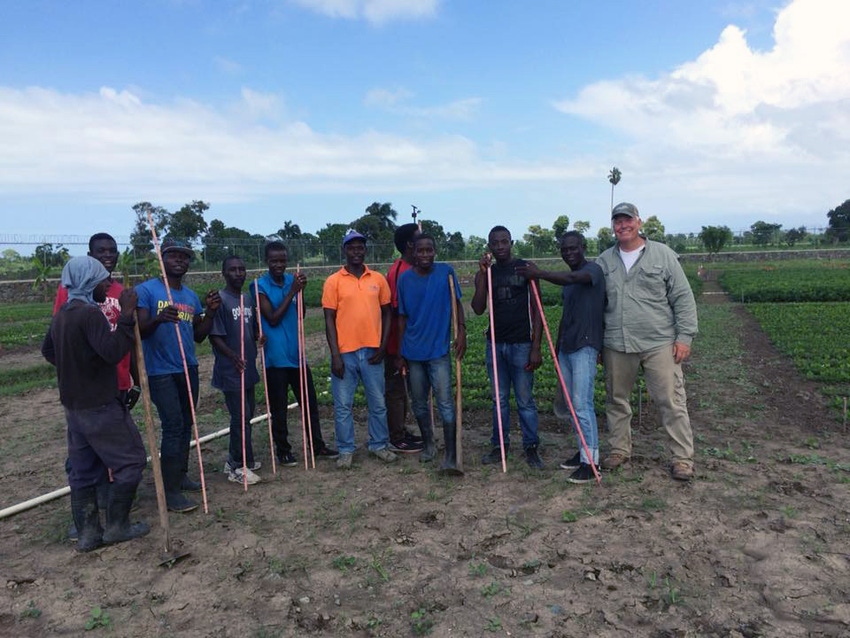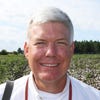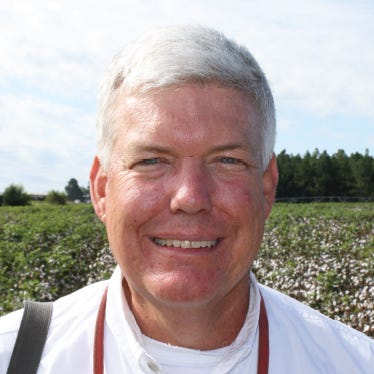
Editor’s Note: The day after this story was published, Bob Kemerait learned Ciliana, the one-year-old he refers to in this piece, unfortunately died June 13 in Cap-Haitien, Haiti.
Ciliana is barely a year old. Her father’s death has left her mother alone to care for three small children in the historic city of Cap Haitien.
Ciliana suffers from severe malnutrition; the kind you see in documentaries. The kind where her survival is uncertain and where her tiny skeleton is so prominent and her suffering so intense that it causes one to drawback for a moment in disbelief and uncertainty.
Kerdenec is the young son of Quesnel, a farmer in the town of Ouanaminthe. Farming is a difficult life everywhere, but life for Haitian farmers is especially desperate as they try to provide for their families on rocky fields and eroded soils. For peasant farmers in Haiti, the only implements may be a machete and a hoe to clear and till the soil and weed the crop. Few options exist for improved varieties or for protecting their crop from diseases and insects.
Breaking ground for planting is done with heavy steel hoes and strong backs that glisten with sweat in the searing heat of a tropical sun. Ciliana and Kerdenec share more than the hardships of life in Haiti. Both children benefit from joint projects conducted by the United States Agency for International Development’s Peanut Mycotoxin and Innovation Lab (USAID-PMIL), Meds and Foods for Kids (MFK) and the Acceso Peanut Enterprise Corporation funded through the Clinton Foundation. At the heart of these efforts, literally and figuratively, are peanuts.
I was recently in Haiti’s Central Plateau with my MFK counterpart, Alex Carroll, rating research plots for diseases. As part of a USAID-PMIL project through the University of Georgia and the University of Florida, we partner with Meds and Foods for Kids (MFK) in Cap Haitien. A six-hour drive along tortuous mountain roads and the unrelenting Haitian heat slowed my movements and darkened my thoughts as I struggled to rate rust and leaf spot diseases. Sweat from my left-handed-scribble smeared the ink across my data sheets, I tried to stay focused on the task at hand.
Throughout the afternoon, my phone buzzed continuously as text message after text message found its way to this isolated field in remote Haiti. Messages included requests for diseases management options, reminders that report were needed “yesterday”, and when I would be available for a field visit? Each was a reminder of familiar questions, “Why are you going to Haiti now?? Don’t you have enough to do right here in Georgia’s peanut fields?” That night I tossed and turned, soaked in sweat and agitated by the incessant whine of mosquitos. Between brief bouts of restless sleep, I asked myself, “What AM I doing here??”
My colleagues, peanut specialists from Georgia and Florida, and I go to Haiti because it is important. We go to Haiti and work with poor farmers to grow peanuts more profitably. We go to Haiti to help MFK produce a high quality product that saves the lives of malnourished children. Efforts of the USAID PMIL program and Meds and Foods for Kids are a source of pride and appreciation back home in America, rather than a threat to our peanut industry.
In fact, over the years the American Peanut Council has assisted MFK with technical issues and Birdsong Peanut has generously supported MFK in different ways. Since 2002, county agents, peanut farmers, journalists, students from UGA and UF, and many university colleagues have shared in our work in Haiti and also Guyana.
How does all of this impact Ciliana and Kerdenec and countless others in Haiti? The answer is simple; the implementation is not. Dr. Patricia Wolff, a pediatrician from St. Louis, had an idea to produce “Medika Mamba”, a peanut-based paste for treatment of severe and acute malnutrition in children. A similar product, “Plumpy Nut”, was already produced by the Nutriset company and proved to bring the most severely malnourished children back from certain death.
However, Dr. Wolff’s vision did not end with production of Medika Mamba. Similar products are produced in developed countries and shipped to where they are needed. Dr. Wolff’s vision was to not only to produce Medika Mamba, but also to source peanuts from local producers. In buying peanuts from Haitian farmers, Meds and Foods for Kids would also support the livelihood of the local communities as well.
A decision to source Haitian peanuts was admirable but has been difficult to implement. Producing a steady supply of quality, aflatoxin-free peanuts continues to be a significant challenge. Our efforts through the USAID-PMIL program have focused on selection of improved varieties for increased yields, technologically-appropriate disease and weed management programs, soil nutrition and aflatoxin mitigation. Results from research efforts are shared through grower trainings and production guides. There is still much to be done, but improvements in peanut production are being made and shared with the farmers.
It is still too early to know if Ciliana will survive; Sarah, her nurse from MFK, told me that her condition is especially critical because of acute malnutrition and an enlarged heart. It is also too early to know how Kerdenec’s life and future as a peanut farmer will be improved from his father’s. But it is clear peanuts and the tools to grow better peanut can save and improve lives.
There are so many problems in the world that I can do nothing about. But helping peanut farmers in Haiti through USAID PMIL is something I can do. And THAT is why we travel to Haiti; all the while mindful that we represent the University of Georgia and the peanut farmers of our Southeast.
About the Author(s)
You May Also Like






